ACT 1: Granddaddy Folsom
Law enforcement is not a job but a calling. One often hears of “law enforcement is in my blood.” For me, the seeds of the calling began with my grandfather, Oscar Folsom, Sr. He was a deputy sheriff in Atoka County, Oklahoma, and later served as sheriff. It was unusual for a full-blood Choctaw to be elected to a high public office. Later, my father, Sgt. William J. “Bill” Folsom served with the 45th Infantry Division Military Police in Japan and Korea. I was a late-bloomer, worming my way into law enforcement in 2007. Granddaddy Folsom was a dark-skinned, solemn veteran of World War I, and he terrified me! We would visit Atoka, Oklahoma, and we always got the “y’all keep it down and don’t bother Granddaddy” warning, and we took it to heart! He would sit quietly and eat an entire Mason jar of jalapeños each evening and had very little to say. I wish I had been bolder and dared ask him to tell his stories. This particular story involves my grandfather and one of the most notorious gangs in American history, the Clyde Barrow gang, which included his girlfriend, Bonnie Parker. Bonnie and Clyde were romanticized in films and stories but were part of a murderous gang.
Act 2: The Barrow Gang
The Barrow gang included Clyde; Bonnie; Clyde’s brother Buck and his wife, Blanche; W.D. Jones; Henry Methvin; Raymond Hamilton; Joe Palmer; and Ralph Fults. Active from 1932-1934, they were responsible for the murders of nine law enforcement officers and several others before Clyde and Bonnie died in a hail of bullets in Louisiana in May 1934. Before they ended their crime spree, fate brushed the gang up against Granddaddy Folsom.
Act 3: Stringtown Dance Hall
It was a dark night around 11:00 pm on August 5, 1932, when Atoka County Sheriff Charlie Maxwell and Deputy Sheriff (sometimes called Undersheriff) Eugene “Gene” Moore decided to check on the rowdy dance hall off Route 69 in Stringtown, about 9 miles from the county seat, Atoka. It was a busy night spot in the middle of nowhere with an open-air pavilion behind the building for dancing. Prohibition was in effect, but local law enforcement didn’t bother much with dance hall drinking unless things got out of hand. There had been a disturbing the peace complaint because the local men were angry about a flashy group of men from Dallas who were invading their territory and flirting with their women. Sheriff Maxwell asked Deputy Moore to accompany him to the dance hall, ostensibly because Sheriff Maxwell wanted to ride in Moore’s new Chevrolet. The other deputy on that night, Deputy Sheriff Oscar Folsom, did not accompany them. He was feeling under the weather with a cold (although he, too, had a new car).
Sheriff Maxwell and Deputy Moore arrived in the parking lot just as musician Duke Ellis started to play “Way Down Yonder.” The sheriff saw a group of men swigging from flasks in a parked car. He walked up and said, “You four can consider yourselves under arrest.” Immediately, Clyde Barrow and Raymond Hamilton opened fire, striking Sheriff Maxwell seven times, gravely wounding him. Deputy Moore was still in the car with a woman captured after escaping from prison in McAlester, Oklahoma. On hearing the gunfire, Deputy Moore exited his vehicle and took cover behind a Model T. When he peeked up to see where the assailants were, he was shot and killed by a single bullet from a .30-caliber Stevens automatic rifle. Musician Ellis said he had just started playing the song when “hell broke loose, and I mean hell.”
Spinning dust and gravel from the tires of Barrow’s stolen vehicle, the gang disappeared into the hot Oklahoma night under a waxing crescent moon, leaving gang member Ross Dyer behind. He blended in with the crowd and slipped out, later apprehended in McKinney, Texas. Some reports say Bonnie was there, but she probably was visiting her mother in Texas at the time. Deputy Moore lay dead, and Sheriff Maxwell suffered severe wounds that would debilitate him for the rest of his life. Eugene Capell Moore was 30 years old, serving only one year as a deputy.
Act 4: Enter Granddaddy
The response is rapid and massive when a law enforcement officer goes down in the line of duty. Communications were different back then, and the area was relatively sparsely populated. Lawmen began streaming toward Atoka County to search for the murderers. Grandaddy Folsom climbed into his new Oldsmobile with another man and headed down the dusty county roads, looking for the gang who killed his friend and colleague. As they went down a gravel back road, they spotted a man standing at the roadside in front of his house. They asked him if he had seen any suspicious vehicles passing by, and he had not. They asked him if he had a gun, and he said he did, so they deputized him on the spot. They instructed him to watch for any suspicious vehicles and, if spotted, to stop them at all costs. Continuing down the back roads for an hour or so, they returned down that same road. As they approached the recently deputized man, he stepped into the center of the road, leveled his shotgun, and blasted Grandaddy’s car damaging the engine and destroying the dashboard. Fortunately, the two men were unhurt. They were furious, though! On confronting the man who dropped his shotgun as ordered, they found that he had been drinking, perhaps to steel his courage for facing the Barrow Gang. They arrested him, but Grandaddy’s poor new car never ran right again, despite repair.
The gang escaped that night, and Deputy Moore was the first of nine lawmen they murdered. The dance hall building functioned as a fruit stand for many years before burning to the ground in 2012. A granite marker erected in 2007 remains on the site to commemorate Deputy Sheriff Moore.
Epilogue:
Bonnie & Clyde were ambushed and killed by a posse of law enforcement officers on May 23, 1934. Raymond Hamilton was executed in 1935. After Grandaddy Folsom died and Grandma Folsom was getting on up in years, the family began sorting collected items and keepsakes. Grandaddy’s gun would come out on Grandma’s lap for years if she got spooked while she would sit alone on her front porch. His holster, nightstick, and badge all survived. One item, in particular, was discovered in the various containers. Deputy Gene Moore’s pistol had been given to Grandaddy by his widow, Minnie. After a pre-Google search in the 1980s, the family located descendants of Deputy Moore and returned the pistol to them.
Depending on the writer and the historical information available, there are variations in the details of August 5, 1932. This version matches most closely with the recollections of my family and written accounts from various sources.


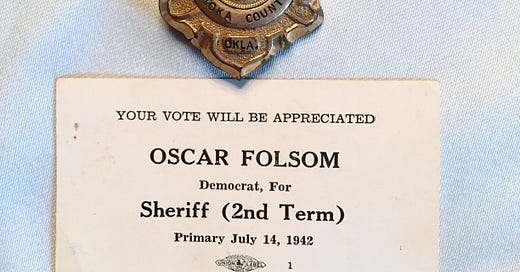



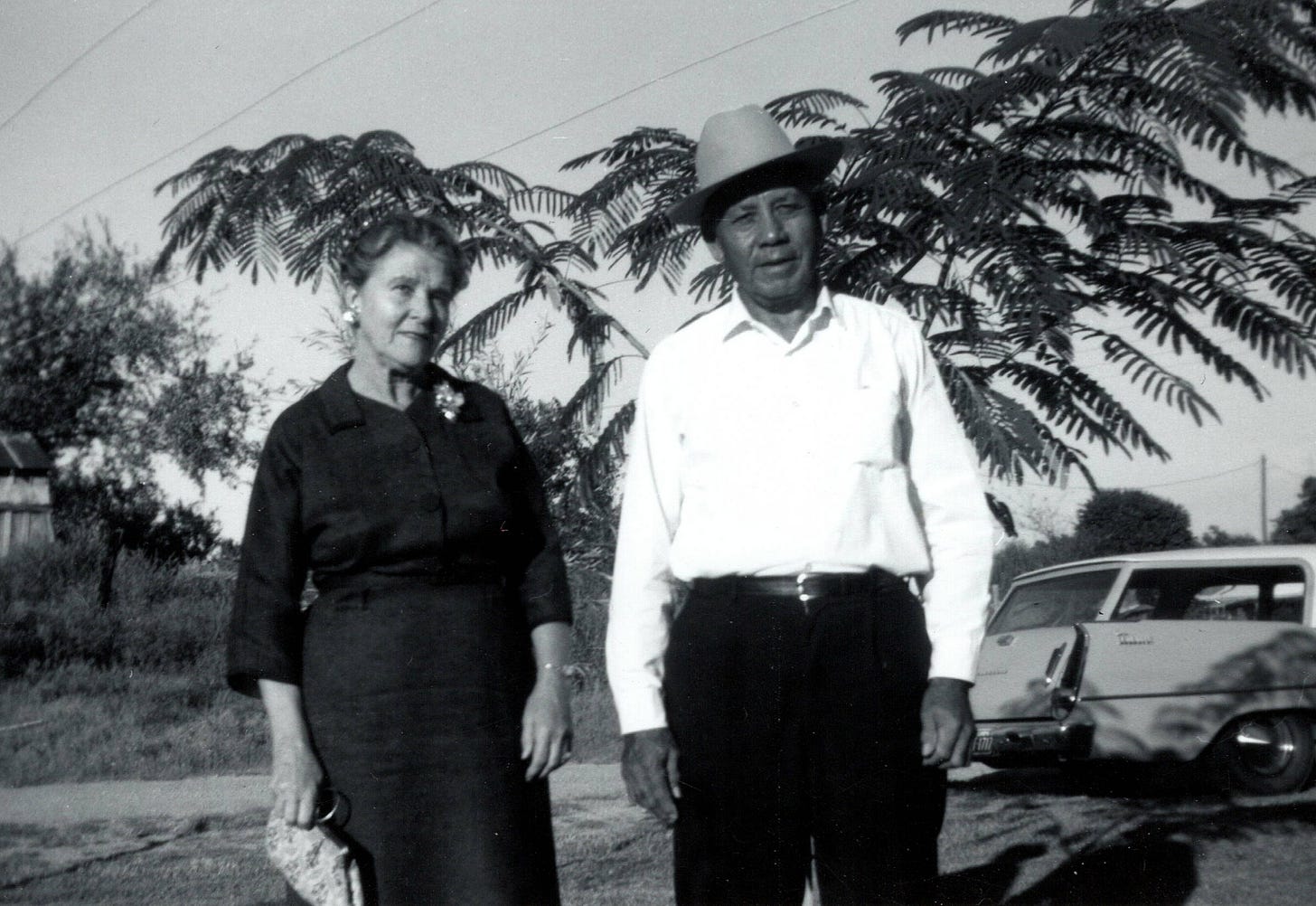
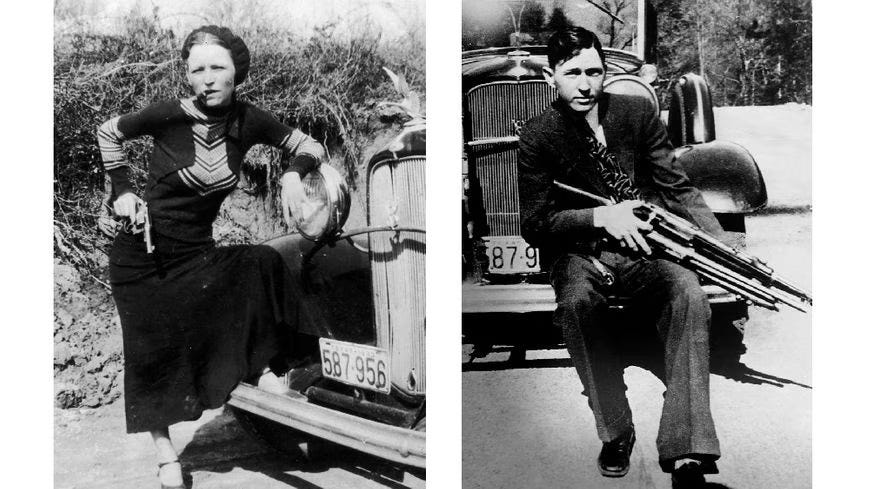
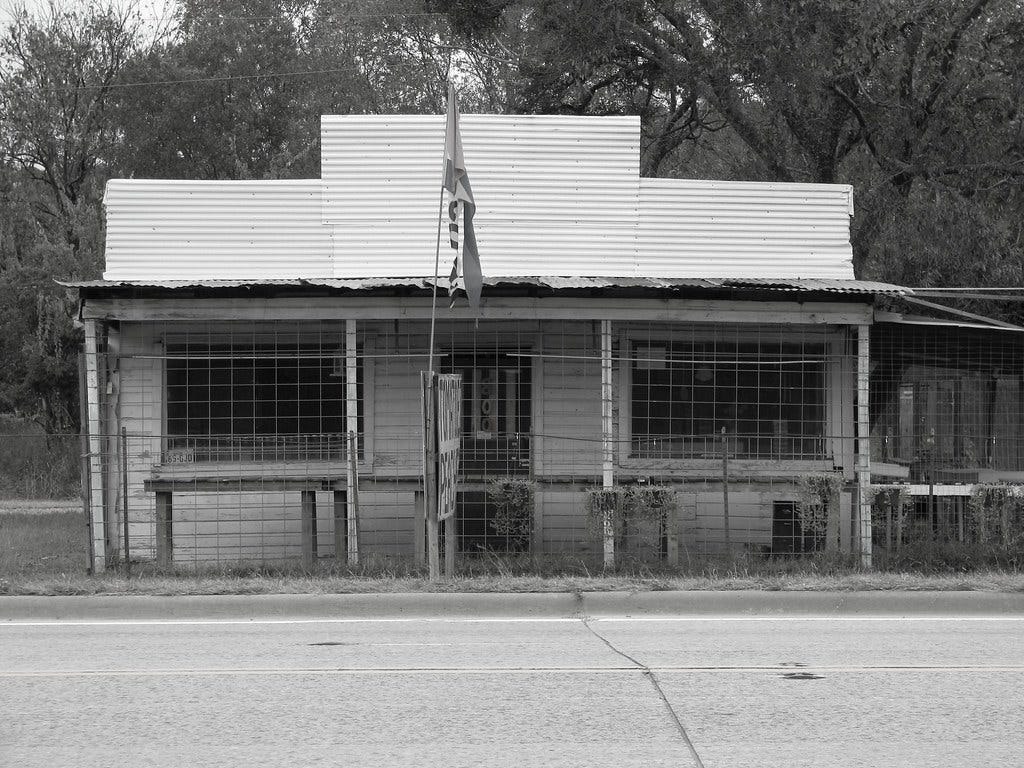
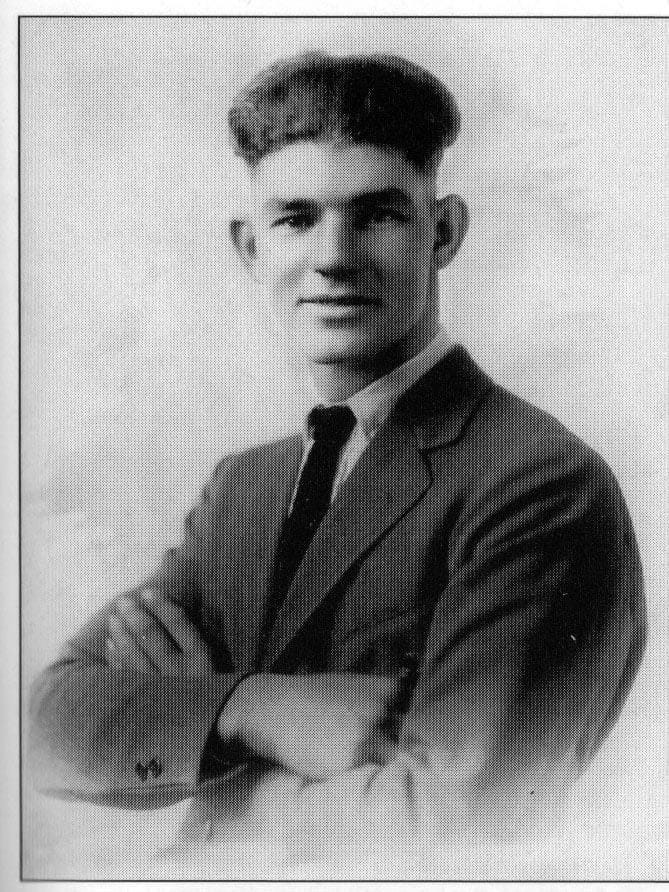
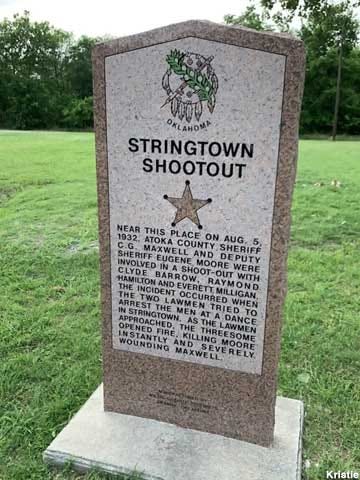
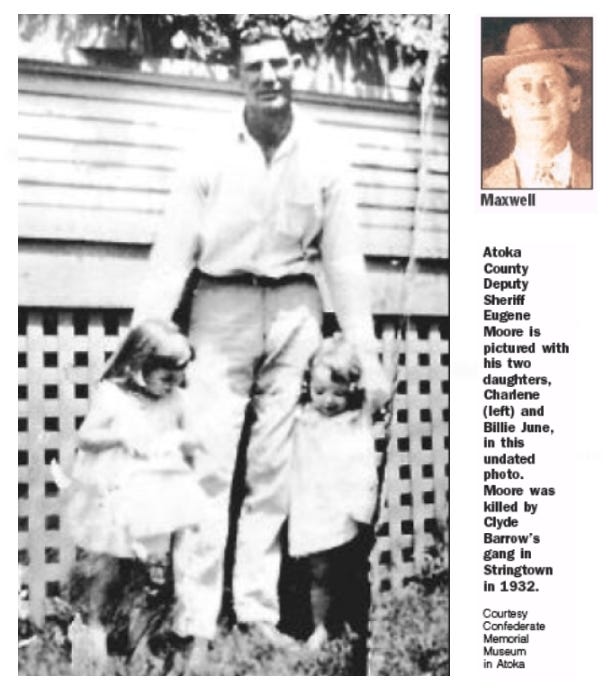
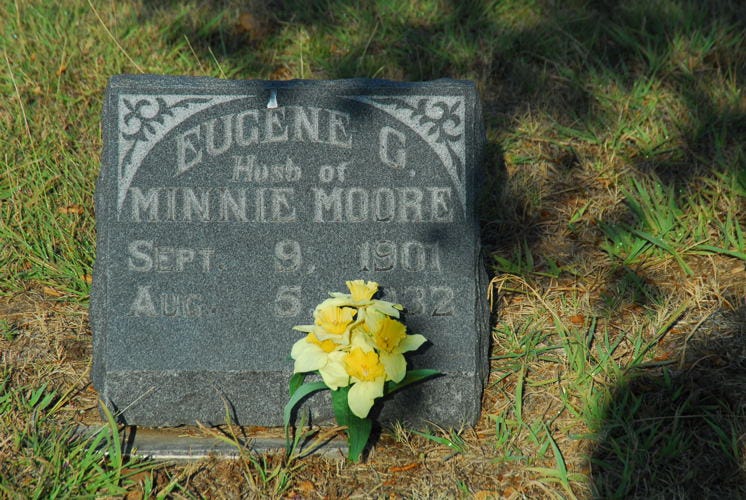
Thank you my favorite writer. Great read!
Cool story. Thanks for sharing.